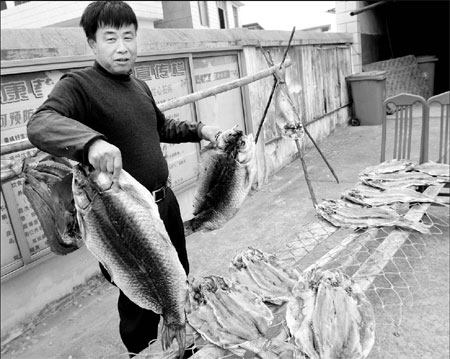|
|

Zhang Chunshui, 54, prepares fish for drying in the open air in his yard in Datang village, Jiangxi province, last week. Zhang Wei / China Daily
|

Average incomes fall to a third of those in 2010
JIUJIANG, Jiangxi - Zhang Chunshui is no stranger to the fish market. But it was a humbling experience when he visited one in downtown Jiujiang this month.
"The last thing a fisherman wants to do is to buy fish. But I did, and it makes me feel ashamed," the 54-year-old said with a forced smile, as he hung the fish he bought on a rope in his yard in Datang village, Jiangxi province, in preparation for drying them.
This is the first year Zhang can remember that his family bought fish for the Spring Festival dinner. Fish, a symbol of affluence in Chinese culture, is a main dish on Lunar New Year's Eve, which falls on Jan 22 this year.
Having a fish dish has never been a problem for fishermen in Datang village, which sits along China's largest freshwater lake, Poyang Lake.
But the lake has dwindled to less than 200 square kilometers - from its peak of 4,900 sq km, nearly seven times the size of Singapore - leaving fishermen in the village nothing to fish, said Zhang Qiulin, head of the Datang village.
After a day's hard work, fishermen now have no more than a bucket of fish, while the catch used to be measured by the vat.
Jiangxi province got 50 to 90 mm of rain from Jan 13 to 16, increasing the lake area from 175 sq km on Jan 6 to 230 sq km on Jan 16, according to the Jiangxi Poyang Lake Hydrologic Bureau.
But it hasn't done much good for the fishermen.
"Some elderly people, who know the lake well, told me this ongoing drought has sapped its vitality and it will take at least five years for it to recover," Zhang Qiulin told China Daily.
The shrinking lake has endangered livelihoods in the village, where 1,030 of the 1,285 residents support themselves through fishing, he said.
"Many young people are choosing to go to cities to earn their living, twice as many last year as in 2010 because of the drought," he said with a sigh.
A fishing boat could earn 20,000 yuan ($3,175) to 30,000 yuan last year, one-third of what it was in 2010, Zhang said.
The trend is familiar throughout Jiangxi province. According to the provincial fishery bureau, fishermen's average annual per capita income fell to 1,000 yuan in 2011 from 3,000 to 4,000 yuan in previous years.
To make ends meet, fisherman Zhang Chunshui's wife worked as a cook in the nearby Xingxi industrial zone and their younger son went to work in Beijing as a handyman.
Some fishermen still tried their luck on the lake, not catching fish, but "fishing" for scrap iron on the lakebed with magnets installed on the bottom of their boats. They could make some "pocket money" selling the iron, said Zhang Qiulin, the village head.
The meager catches on Poyang Lake also triggered increases in the price of aquatic products. A kilogram of carp cost 12 yuan in 2010, but the price rose to nearly 20 yuan last year, and it's still going up, said Zhang Qiulin.
In markets in Jiujiang, most fish is brought in from nearby Hubei province.
After some good rainfall in July and August, Poyang Lake has experienced an extended dry period since October. The water level at Duchang Hydrometric Station stood at 7.79 meters on Jan 6, the lowest level since 1952.
According to the Jiangxi Poyang Lake Hydrologic Bureau, the lake had 974 mm of precipitation in 2011, about 30 percent less than the annual average for the past six decades.
To restore fish stocks, authorities have imposed a fishing ban from March to May each year since 2002.
"But the hope that the lake will recover quickly is dim. Most of the immature fish have died because they cannot survive the severe drought," Zhang Qiulin said.
China Daily
(China Daily 01/18/2012 page5)
|